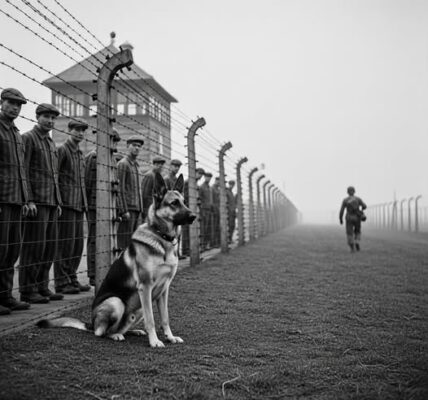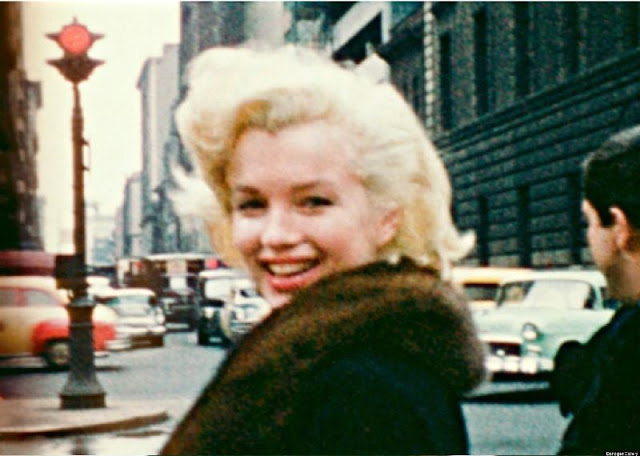Brothers on Omaha Beach – Normandy, 1944
Omaha Beach, June 6, 1944. The sea was kicking up foaming waves, and the air was filled with the sound of gunfire, screams, and bullets whistling overhead. For many young American soldiers, it was their first step onto German-occupied European soil, and also the last day of their lives. Among those who landed on the bloody sands of Normandy were two brothers. They arrived together, in a landing craft, clutching their weapons, trying to quell the fear that grew with each passing second.
Waves crashed against the metal barriers known as “Czech Hedgehogs,” and the sand mingled with blood and smoke. As the barge’s ramp lowered, the soldiers ran straight into the fire of MG 42 machine guns, which cut through the ranks from the German bunkers like a scythe through grass. The brothers clung close together, as if their bond could protect them from bullets. But the chaos of war knows no mercy. At one point, one of the bursts pierced the younger of the two. He collapsed onto the sand, his body twisting in pain as blood instantly soaked his uniform.
The older brother froze for a second, then, ignoring the enemy fire, rushed toward him. He crawled across the wet sand, hiding among the bodies of the fallen and the shell holes. When he reached it, he placed a hand on the wounded man’s helmet and leaned forward, allowing his words to carry above the din of battle. “I’ll carry you home,” he whispered, his voice trembling, though he knew no amount of strength would allow him to lift his brother and survive the rain of bullets.
He held him, trying to stop the bleeding, praying the paramedics would arrive in time. But seconds turned to minutes, and the life in the wounded man’s eyes slowly faded, like a candle burning out in the wind. His brother wouldn’t let go of him for a moment. He felt that if he removed his hands even for a moment, if he looked away even for a moment, his brother would pass away sooner. In this hell of war, amidst the explosions and groans, two young men found a moment of silence—a moment where one heart beat for the other.
His older brother survived. He was pushed away from the body by the paramedics who carried his brother from Omaha Beach, but he knew even then that this would not be the way “home.” The coffin, wrapped in a flag, would never replace the warmth of his voice, fading in his arms. He himself returned to America, but never truly returned.
Every year on Remembrance Day, he stood at the military cemetery. He folded two flags: one for his country, the other for his brother, who had never left the Normandy beaches. Looking at the rows of white crosses in Colleville-sur-Mer, he saw not only thousands of fallen soldiers, but above all, one face—the face of his brother, who remained forever young, forever on the sands of Omaha.
The story of the brothers from Omaha Beach is not only a family drama but also a fragment of the larger narrative of D-Day, the largest amphibious operation in history – Operation Overlord. On June 6, 1944, the Allies opened the way to the liberation of Europe from German occupation. The cost was terrible: thousands of dead and wounded who gave their lives for freedom. Among them were soldiers of the 1st and 29th Infantry Divisions, who faced German bunkers, artillery fire, and the rigors of the landing itself.
Omaha Beach has gone down in history as a symbol of courage, sacrifice, and suffering. But for those who lost loved ones there, it was above all a place of personal tragedy. The older brother who survived carried the burden of guilt throughout his life—the question of why he had survived and not his brother. No decoration, no medal could ease this pain. Every waft of the American flag reminded him that somewhere in Normandy, beneath a white cross, rested the one he loved most.
Today, when tourists visit Omaha Beach, they see a calm sea and quiet sand where children play. It’s hard to believe that in this place, the earth was soaked with the blood of thousands of young men. But that’s precisely why such stories must be told. Because history lives not in textbooks, but in the emotions we pass on—about brothers, about promises whispered in the heat of battle, about flags laid annually at a grave.
It is personal memories that give meaning to great historical events. D-Day is not just a date. It is a collection of individual stories – of fear, brotherly love, pain, and hope. “Brothers on Omaha Beach” is one of them. A story that shows that war, though it takes lives, cannot rob a person of their capacity for love and faithfulness to the end.






